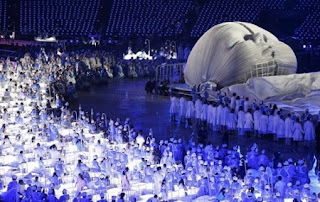Brave New World
Antes que nada, lo innegable: Huxley escribía muy lindo.
Bueno, los que supuestamente no están civilizados tampoco la pasan bien y el planteo se pone más interesante.
Los del mundo "perfecto" construyeron a los salvajes (no les hacen llegar las comodidades, ni siquiera la higiene, que a ellos les sobran) como el ejemplo de la anticiencia para que nadie (se asume) quiera volver ahí.
Excepto los salvajes.
El mundo, entonces, está dividido en dos espacios con dos tipos de extremistas: un mundo totalmen
te racional y sin pasiones (el de la ciencia) y uno sumido en el oscurantismo, pero donde se mantienen las relaciones humanas (de la mano de la religión).
John, el salvaje,el hijo de los civilizados, esá en el umbral y, al mismo tiempo, no pertenece ni al mundo mágico ni al racional. Conoce las historias míticas, pero no lo dejan participar de los rituales. Sabe leer y conoce a Shakespeare... pero este es un escritor obsoleto en el mundo de la ciencia.
Charla sobre Dios entre el "salvaje" y Mustapha Mond, que dice que el hombre construye sus dioses:
The Savage interrupted him. "But isn't it natural to feel there's a God?"
El cuestionamiento sobre qué es natural es interesante. Pero sigue sosteniendo la idea acerca de las consecuencias del ateísmo (claro, estaban en plena crisis de las creencias y al borde de la Segunda Guerra Mundial).
En el mundo real, ciencia y religión son totalmente compatibles.
El salvaje se podría quedar a disfrutar de las comodidades del progreso científico (y a él no le van a exigir que sea como los demás, aunque se le complicarían las relaciones con el resto) pero chifla completamente y se va a una especie de retiro espiritual... y lo terminan convirtiendo en una atracción más. En un documental.
Mond también está familiarizado con Shakespeare y The Tempest (de donde sale la cita que le da origen al título de la novela... título ofrecido por el salvaje), así que sabe perfectamente que el salvaje es un Caliban, que digirió lo que encontró, un híbrido, el resultado de los dos mundos (aunque trate de purificarse el sistema digestivo a cada rato)... a su vez, la sociedad terminó digiriendo al salvaje.
Al final, el libro quizás apunte a esos extremos o quizás no. El autor no siempre coincide con lo que piensan los personajes y voy a dejar el otro post como recordatorio; así termino los libros antes de hacer juicios apresurados.
Citas sobre la imposibilidad entre la ciencia y lo emocional (lo irracional) según los habitantes del mundo donde todos son felices:
instability means the end of civilization. You can't have a lasting civilization without plenty of pleasant vices."




Comentarios
Publicar un comentario